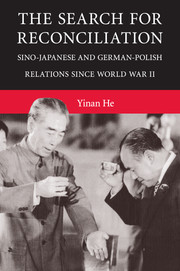Book contents
- Frontmatter
- Contents
- Tables and Illustrations
- Acknowledgments
- List of Abbreviations
- List of Postwar Japanese Prime Ministers and (West) German Chancellors
- Chronology
- Introduction
- 1 Explaining Deep Interstate Reconciliation
- 2 When East Meets West: Postwar German-Polish Reconciliation
- 3 Initial Isolation: Pre-Normalization Sino-Japanese Relations
- 4 The “Honeymoon” Period: Sino-Japanese Relations, 1972–1981
- 5 An Old Feud Comes Back: Sino-Japanese Relations in the 1980s
- 6 Volatility and Downward Spiral: Sino-Japanese Relations from the 1990s to the Present
- Conclusion
- Appendix
- Bibliography
- Index
4 - The “Honeymoon” Period: Sino-Japanese Relations, 1972–1981
Published online by Cambridge University Press: 04 August 2010
- Frontmatter
- Contents
- Tables and Illustrations
- Acknowledgments
- List of Abbreviations
- List of Postwar Japanese Prime Ministers and (West) German Chancellors
- Chronology
- Introduction
- 1 Explaining Deep Interstate Reconciliation
- 2 When East Meets West: Postwar German-Polish Reconciliation
- 3 Initial Isolation: Pre-Normalization Sino-Japanese Relations
- 4 The “Honeymoon” Period: Sino-Japanese Relations, 1972–1981
- 5 An Old Feud Comes Back: Sino-Japanese Relations in the 1980s
- 6 Volatility and Downward Spiral: Sino-Japanese Relations from the 1990s to the Present
- Conclusion
- Appendix
- Bibliography
- Index
Summary
This chapter explains the significant progress in Sino-Japanese reconciliation from the two nations' diplomatic normalization in 1972 to the beginning of the 1980s. Because of the escalation of the Sino-Soviet split and the dramatic rapprochement between China and the United States, from the beginning of the 1970s China and Japan faced a common Soviet enemy. Given such positive structural conditions, realist theory would predict that the two countries should have reached deep reconciliation. In reality, Sino-Japanese political relations indeed entered a short-lived “honeymoon” period, with considerably reduced expectations of bilateral conflict, mutual national recognition, and prospering economic interaction and societal contacts. Yet overall, the relationship progressed only to the stage of shallow reconciliation–rapprochement, falling short of deep reconciliation. Bilateral security cooperation was seriously limited, and the two governments also failed to permanently resolve outstanding sovereignty controversies regarding Taiwan and offshore islands. Their commercial ties lacked interdependence in any strategic sense, and the atmosphere of popular friendship was largely simulated by government propaganda rather than built on genuine mutual understanding.
Reasons for the absence of deep reconciliation include Japan's fear of being dragged into the Sino-Soviet conflict if it drew too close to China and obstruction from the pro-Taiwan faction in Japan of a tight relationship with China. Another important restraining factor in the reconciliation process was the negative impact of war memory.
- Type
- Chapter
- Information
- The Search for ReconciliationSino-Japanese and German-Polish Relations since World War II, pp. 174 - 205Publisher: Cambridge University PressPrint publication year: 2009



